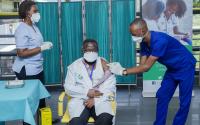[ad_1]
Texas and Mississippi announced yesterday that they were ending mask mandates and opening indoor businesses after a year of restrictions because of COVID-19.
“I just announced Texas is OPEN 100%. EVERYTHING. I also ended the statewide mask mandate,” Texas Gov. Greg Abbott tweeted yesterday afternoon.
Abbott said in a press conference he was not suggesting the threat of COVID-19 was over, but with the arrival of vaccines and a significant drop in cases, the state was ready to reopen beginning Mar 10. Abbott also said his state was vaccinating 1 million people per week, a rate that should comfort those doubtful about lifting restrictions.
In Mississippi, Gov. Tate Reeves ended a statewide mask mandate and also said he was reopening indoor businesses throughout the state.
“Starting tomorrow, we are lifting all of our county mask mandates and businesses will be able to operate at full capacity without any state-imposed rules. Our hospitalizations and case numbers have plummeted, and the vaccine is being rapidly distributed. It is time!,” Reeves tweeted yesterday.
Table of Contents
CDC heads calls lifting restrictions a mistake
The Republican governors both said the openings were necessary for their state economies, which had suffered for too long under closures. But today Centers for Disease Control and Prevention (CDC) Director Rochelle Walensky, MD, MPH, said lifting any restrictions now would be a mistake.
“So much can turn in the next few weeks, ” Walensky said today during a White House briefing. “Cases are leveling off just as the rates of B117 are ready to hijack our success.”
Walensky said 7-day averages for both cases and deaths across the country were up slightly, a sign that 6 weeks of declining virus activity had stalled. The 7-day average of new daily cases was 66,000, up 3.4% from the previous week, and deaths had settled to slightly more than 2,000 per day.
“Whether mandated or not, individuals still need to take steps to prevent the spread of COVID-19, including wearing masks,” Walensky said. She also urged patience, and echoed President Joe Biden’s announcement yesterday that by the end of May, all American adults would be able to be vaccinated.
“We are just 3 or 4 months away from that goal,” she said, urging people do not give into pandemic fatigue.
Continued mask-wearing urged
Barbara Alexander, MD, MHS, the president of the Infectious Disease Society of America, also released a statement urging Americans to continue wearing masks.
“Whether you are vaccinated or not, masks remain crucial to preventing the spread of the virus and should be worn in all community settings. Maintaining social distance, avoiding large gatherings and frequent handwashing continue to be critical to preventing infections,” Alexander said, also noting only around 10% of Americans nationwide have been fully vaccinated.
The United States reported 53,544 new COVID-19 cases and 1,819 deaths yesterday, according to the Johns Hopkins COVID-19 tracker. In total, the country has recorded 28,739,056 cases of COVID-19, and 517,833 deaths, according to Johns Hopkins.
The CDC’s variant tracker shows 2,506 B117 cases in 46 states, 65 B1351 cases in 17 states, and 10 P1 cases in 5 states. Those numbers are likely gross underestimates, and do not include new US-based variants.
Aiming to vaccinate 2 million seniors
Also today at the White House press briefing, COVID-19 czar Jeff Zients said the Biden administration was launching a new initiative to quickly vaccinate 2 million of the most at-risk seniors across the country with the help of 12 major insurance providers.
Zients said the campaign would focus on vaccine education, scheduling appointments, and transportation.
The announcement comes as many states are beginning to vaccinate age groups, bypassing the CDC’s recommended priority groups for vaccination that focus on essential workers and those with certain underlying health conditions. While some proponents of age-based plans say the criteria makes getting the vaccine more equitable, younger people with serious health conditions feel left behind.
Yesterday the CDC said states should consider prioritizing people with disabilities or cognitive decline as they broaden access to COVID-19 vaccines, according to the Washington Post.
“Jurisdictions should consider the unique needs of residents, such as people with disabilities or cognitive decline (and their caretakers), as well as those with limited access to technology, when evaluating vaccination location accessibility, communicating vaccine information, and scheduling appointment,” the CDC said in the updated guidance.
[ad_2]
Source link












